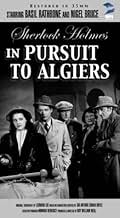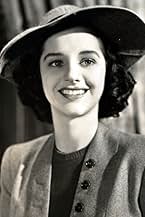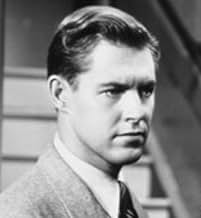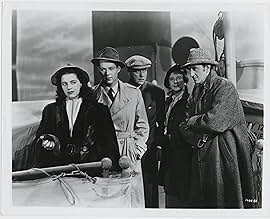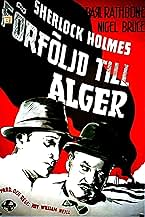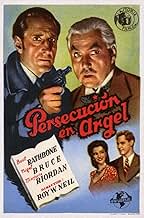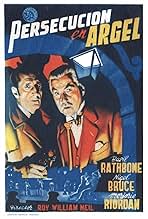VALUTAZIONE IMDb
6,7/10
4379
LA TUA VALUTAZIONE
Aggiungi una trama nella tua linguaHolmes is recruited to escort the heir to a European throne safely back to his homeland after his father's assassination.Holmes is recruited to escort the heir to a European throne safely back to his homeland after his father's assassination.Holmes is recruited to escort the heir to a European throne safely back to his homeland after his father's assassination.
- Regia
- Sceneggiatura
- Star
William 'Wee Willie' Davis
- Gubec
- (as Wee Willie Davis)
Frederick Worlock
- Prime Minister
- (as Frederic Worlock)
Wilson Benge
- Clergyman
- (non citato nei titoli originali)
Sven Hugo Borg
- Johansson
- (non citato nei titoli originali)
Ernst Brengt
- Ship Passenger
- (non citato nei titoli originali)
James Carlisle
- Aide
- (non citato nei titoli originali)
Ashley Cowan
- Steward
- (non citato nei titoli originali)
James Craven
- Anton Petzval
- (non citato nei titoli originali)
Recensioni in evidenza
An unusual 'job' is being offered (or rather commanded) to Holmes this time: he's supposed to guard the heir, whose father has just been assassinated, of the throne to an obscure little kingdom safely to Algiers, from where he'll be taken home.
So an ADVENTUROUS ship's passage lies ahead of Holmes, Watson, and the young monarch; the atmosphere is quite dense (even the fog on deck is thicker than in the streets of London...), the plot is suspenseful and has got its pretty surprising moments; and a special feature for friends of Scottish nostalgia and our good Doctor Watson: here Nigel Bruce gets the opportunity to sing (undubbed!) the old Scottish tune "Loch Lomond"!
One of the lighter entries in the Rathbone/Bruce series, good, solid, classic crime entertainment.
So an ADVENTUROUS ship's passage lies ahead of Holmes, Watson, and the young monarch; the atmosphere is quite dense (even the fog on deck is thicker than in the streets of London...), the plot is suspenseful and has got its pretty surprising moments; and a special feature for friends of Scottish nostalgia and our good Doctor Watson: here Nigel Bruce gets the opportunity to sing (undubbed!) the old Scottish tune "Loch Lomond"!
One of the lighter entries in the Rathbone/Bruce series, good, solid, classic crime entertainment.
I've seen nearly all of Universal's Sherlock Holmes series by now, and have found that the level of quality doesn't vary too much between each instalment. Every entry in the series is worth watching, and I haven't seen any that I would describe as 'bad'. Pursuit to Algiers fits into this equation snugly, but even so; it's definitely one of the lesser Holmes mysteries. It does feature most of what makes the series great beyond the central plot line - such as a great performance from both the leads, a constant stream of intrigue and some great dialogue; but the actual mystery itself is rather lazy. It simply follows Holmes and Watson looking after a prince onboard a ship full of assassins. Adding to this is the fact that the sets are fairly samey, which doesn't help the film as it a few changes of scenery wouldn't have gone amiss. The film seems to know that it isn't the greatest of Holmes mysteries as well; and this translates to the screen. Holmes himself doesn't appear in the film for a proportion of the running time, which is never good when he's the main reason people are watching; and as good as Nigel Bruce is, he's not enough to carry a film about the great literary detective all on his own. I much prefer it when LeStrade features as well. Still, despite it's bad points, Pursuit to Algiers is a worthy yarn and still worth seeing for fans of these films.
Stolen emeralds, an endangered prince, a fog-bound steamship, a plane crash, a revolver hidden in a purse. Through a clever series of encounters, which Sherlock Holmes deciphers with his usual sharp intellect, Holmes and his dear friend, Doctor Watson, are directed to a specific address at a specific time in a foggy London back alley; there, Holmes is engaged by a group of foreign gentlemen to escort an important personage from England back to his home country. While Holmes and Watson do not battle spies in "Pursuit to Algiers," the sleuths do return to matters of foreign intrigue. Leonard Lee wrote the first of two Holmes screenplays for this, the tenth in Universal's Sherlock Holmes series. Lee's screenplay is light on suspense, and, despite the assured direction of veteran Holmes' director Roy William Neill, the film can only be rated better than average among the Rathbone-Bruce movies.
Despite some sinister fog-shrouded scenes in London's back streets, cinematographer Paul Ivano shoots most of the film aboard the S.S. Friesland, a steamer bound for Algiers. While interior shots are crisp black-and-white images, the deck scenes are murky and layered with obviously fake fog. Although the producer-director and the two above-the-title stars are back, not only the writer and cinematographer, but most of the supporting cast are fresh faces in the series. Basil Rathbone and Nigel Bruce are in good form, and Watson is given a bit more to do than usual, including a song entitled "The Bonnie Banks o'Loch Lomond" that spotlights Nigel Bruce's own fine voice; the retelling over dinner of a Holmes adventure, "The Giant Rat of Sumatra;" and a few solo errands of responsibility at Holmes's direction. None of the supporting players stand out, although lovely Marjorie Riordon as a young singer from Brooklyn has a nice voice, and the cold sexually ambiguous Martin Kosleck is appropriately sinister as the knife thrower.
Perhaps after ten episodes the Universal Holmes series had become routine and perfunctory to the participants. The proceedings play out almost entirely aboard a ship, and the plot lacks a single diabolical villain of the caliber of Professor Moriarty or Adrea Spedding, the Spider Woman. However, most Holmes fans should be pleased, and even the sharpest viewers may not guess Holmes's final revelation. While not the best of the series, "Pursuit to Algiers" is good fun and definitely entertaining.
Despite some sinister fog-shrouded scenes in London's back streets, cinematographer Paul Ivano shoots most of the film aboard the S.S. Friesland, a steamer bound for Algiers. While interior shots are crisp black-and-white images, the deck scenes are murky and layered with obviously fake fog. Although the producer-director and the two above-the-title stars are back, not only the writer and cinematographer, but most of the supporting cast are fresh faces in the series. Basil Rathbone and Nigel Bruce are in good form, and Watson is given a bit more to do than usual, including a song entitled "The Bonnie Banks o'Loch Lomond" that spotlights Nigel Bruce's own fine voice; the retelling over dinner of a Holmes adventure, "The Giant Rat of Sumatra;" and a few solo errands of responsibility at Holmes's direction. None of the supporting players stand out, although lovely Marjorie Riordon as a young singer from Brooklyn has a nice voice, and the cold sexually ambiguous Martin Kosleck is appropriately sinister as the knife thrower.
Perhaps after ten episodes the Universal Holmes series had become routine and perfunctory to the participants. The proceedings play out almost entirely aboard a ship, and the plot lacks a single diabolical villain of the caliber of Professor Moriarty or Adrea Spedding, the Spider Woman. However, most Holmes fans should be pleased, and even the sharpest viewers may not guess Holmes's final revelation. While not the best of the series, "Pursuit to Algiers" is good fun and definitely entertaining.
Please make sure and get the UCLA restored version of this classic on DVD. There are some appalling Public Domain versions of the Rathbone/Bruce series floating about, especially in the U.K., which seem to have been ripped from poor quality VHS tapes, and they're worse than VCD quality. You'll certainly enjoy this series even more if you see them in good quality prints. Pursuit To Algiers is not the best of the series - that honour goes to SH and the Spider Woman - but it's very certainly worth watching, as it contains some delightful moments, although the storyline is a bit thin. Poor old Watson is put upon, as usual, while Holmes has, at least, the sense to keep his hair tidily back-combed in this episode, unlike others in the series where his barnet is all over the place. This is one to come back to again and again - a cosy evening in front of the fire, and Holmes and Watson off on a chase. But remember! Do yourself and your family a favour and get the RESTORED version. Avoid the market cheapies!
The definitive movie Sherlock Holmes is Basil Rathbone; the definitive movie Dr. Watson is Nigel Bruce. Together, these two brilliant actors made fourteen Sherlock Holmes films between 1939 and 1946, most of them loosely based on stories by Arthur Conan Doyle; a few based on Doyle stories in name only. All are thrilling, exciting excursions into the realm of mystery and deductive reasoning, even the later low-budget ones.
The original pairing of the super sleuth with his bumbling if lovable assistant portrayed by Rathbone and Bruce was in "The Hound of the Baskervilles," where star billing went to Richard Greene as Sir Henry Baskerville. The popularity of Holmes and Watson showed the studio that the audience cared more for the two supporting players than for the somewhat stiff Greene. Next time in "The Adventures of Sherlock Holmes," Rathbone and Bruce deservedly received top billing.
During World War II with England in peril from the Luftwaffe, Holmes and Watson were utilized to booster the war spirit. Holmes could be heard at the end of the war-time films haranguing his fellow countrymen and their ally, the United States, about patriotism and gallantry. Winston Churchill was touted as the savior of his nation.
"Pursuit to Algiers," based on Doyle's "The Return of Sherlock Holmes," finds the crafty detective helping escort Nikolas (Leslie Vincent), heir of a foreign country and a target for conspirators, to assume his crown following the assassination of his predecessor. There are many clever scenes involving Dr. Watson unknowingly being used as a decoy to protect Nikolas. When Nikolas' supporters first contact Holmes surreptitiously, they employ a ruse involving a fish and chips cypher, beyond Watson's grasp. In the process Watson is propositioned by a hooker who calls the good doctor, Ducky, much to his chagrin. Holmes takes the high road by plane; Watson takes the low road by boat. There is much chicanery aboard the ship that takes up most of the movie. The ending may come as a surprise for many.
One of the high points of "Pursuit to Algiers" is Watson's story of "The Giant Rat of Sumatra." Entreated by his fellow passengers to tell about one of Sherlock Holmes' greatest adventures, Watson volunteers to entertain all with his giant rat fable. His use of inanimate objects on the table for purposes of illustration to make the exploits he relates more colorful is well worth the price of admission.
There are more songs than usual for a Sherlock Holmes outing. Such traditional Scottish airs as "Flow Gently Sweet Afton," sung by Marjorie Riordan as a girl from Brooklyn named Sheila Woodbury with something hidden in her sheet music satchel and "Loch Lomond," sung by Watson himself, not only serve as icing but are utilized to embellish the plot.
The twelfth in the Sherlock Holmes series and coming at the end of the war, "Pursuit to Algiers" is one of the most entertaining of the lot and there is no rousing speechifying by Holmes at the end. Those speeches were wonderful morale buildings at the time, but are a bit quaint for today's audiences.
The original pairing of the super sleuth with his bumbling if lovable assistant portrayed by Rathbone and Bruce was in "The Hound of the Baskervilles," where star billing went to Richard Greene as Sir Henry Baskerville. The popularity of Holmes and Watson showed the studio that the audience cared more for the two supporting players than for the somewhat stiff Greene. Next time in "The Adventures of Sherlock Holmes," Rathbone and Bruce deservedly received top billing.
During World War II with England in peril from the Luftwaffe, Holmes and Watson were utilized to booster the war spirit. Holmes could be heard at the end of the war-time films haranguing his fellow countrymen and their ally, the United States, about patriotism and gallantry. Winston Churchill was touted as the savior of his nation.
"Pursuit to Algiers," based on Doyle's "The Return of Sherlock Holmes," finds the crafty detective helping escort Nikolas (Leslie Vincent), heir of a foreign country and a target for conspirators, to assume his crown following the assassination of his predecessor. There are many clever scenes involving Dr. Watson unknowingly being used as a decoy to protect Nikolas. When Nikolas' supporters first contact Holmes surreptitiously, they employ a ruse involving a fish and chips cypher, beyond Watson's grasp. In the process Watson is propositioned by a hooker who calls the good doctor, Ducky, much to his chagrin. Holmes takes the high road by plane; Watson takes the low road by boat. There is much chicanery aboard the ship that takes up most of the movie. The ending may come as a surprise for many.
One of the high points of "Pursuit to Algiers" is Watson's story of "The Giant Rat of Sumatra." Entreated by his fellow passengers to tell about one of Sherlock Holmes' greatest adventures, Watson volunteers to entertain all with his giant rat fable. His use of inanimate objects on the table for purposes of illustration to make the exploits he relates more colorful is well worth the price of admission.
There are more songs than usual for a Sherlock Holmes outing. Such traditional Scottish airs as "Flow Gently Sweet Afton," sung by Marjorie Riordan as a girl from Brooklyn named Sheila Woodbury with something hidden in her sheet music satchel and "Loch Lomond," sung by Watson himself, not only serve as icing but are utilized to embellish the plot.
The twelfth in the Sherlock Holmes series and coming at the end of the war, "Pursuit to Algiers" is one of the most entertaining of the lot and there is no rousing speechifying by Holmes at the end. Those speeches were wonderful morale buildings at the time, but are a bit quaint for today's audiences.
Lo sapevi?
- QuizThe film contains a couple of clever in-jokes for Holmes aficionados in the form of references to famous unrecorded cases for the Great Detective: at one point Watson begins to recite the tale of The Giant Rat of Sumatra (mentioned in Conan Doyle's "The Adventure of the Sussex Vampire"); whilst the action takes place aboard the S.S. Friesland (from Conan Doyle's "The Adventure of the Norwood Builder", and alluded to as "a Dutch-American liner" in his Professor Challenger book "The Lost World", though here it has links to Malmö in Sweden). The film also borrows some characters and events from "The Adventure of the Red Circle."
- BlooperDr Watson discovers an automatic pistol --- i.e., one with a slide-in ammo-clip instead of a rotating cylinder --- in a lady passenger's handbag. He consistently refers to the handgun as a revolver. An ex-Army officer like Watson, no matter how daft, would never make such an "obvious" mistake.
- Citazioni
Sherlock Holmes: Possibly, poison is a woman's weapon.
- ConnessioniEdited into Who Dunit Theater: Sherlock Holmes and Pursuit to Algiers (2021)
I più visti
Accedi per valutare e creare un elenco di titoli salvati per ottenere consigli personalizzati
- How long is Pursuit to Algiers?Powered by Alexa
Dettagli
- Data di uscita
- Paese di origine
- Lingua
- Celebre anche come
- Pursuit to Algiers
- Luoghi delle riprese
- Azienda produttrice
- Vedi altri crediti dell’azienda su IMDbPro
- Tempo di esecuzione
- 1h 5min(65 min)
- Colore
- Proporzioni
- 1.37 : 1
Contribuisci a questa pagina
Suggerisci una modifica o aggiungi i contenuti mancanti

